Phantom of the Paradise is a wonderful mess. It’s the kind of movie that merrily wears its inspirations like garish pins. Yet, no matter how well they could conceivably fit together, this collage of gothic horror allusions and rock operatics never coalesces into the smooth amalgamation it wants to be. The result, however, is a cult classic from a legendary director at the beginning of a brilliant career. It’s another great example that what’s beloved doesn’t have to be beautiful.
The film is a walk through hell with hapless composer Winslow Leach (William Finley). Auditioning his rock cantata for the reclusive musical genius Swan (Paul Johnson), the piece is a potential hit. However, the odious mastermind behind iconic music movements has no intention of sharing the spotlight. Swan steals the fantastic work sending Leach down a tragic spiral towards disfigurement and madness. Surviving this dreadful decline turns him into the twisted Phantom plaguing the palatial auditorium known as the Paradise where Swan hopes to usher in a new line of rock gods. Leach’s only solace, the fabulous voice of Phoenix, a young aspiring singer. Unfortunately, Swan has eyes on her as well.
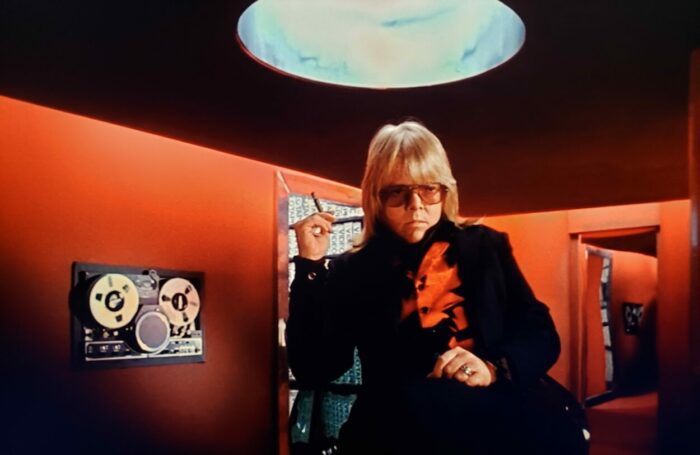
On paper, the plot sounds grandiose in all the right ways. Written by Brian De Palma, it would be the rising director’s seventh film. More importantly, it would expand on his ability to conceive of a cinematic world that doesn’t “pretend to have an existence beyond that which is projected on the screen. But, having baldly admitted that fact… takes on its own reality.” This notion was noted by Vincent Canby regarding De Palma’s first feature-length flick Murder a la Mod from 1968, and the quote would continue to oddly encapsulate the best works by the director.
These are visual universes which ignore the notion of film as moving literature. Instead, they create worlds which defy conventional reality, birthing their own kind of satirical cinematic criticism. In such flesh and blood cartoons, De Palma is able to present things like heroism in a light that is equally inspiring and ludicrous. Consider the oil and water morality of 1987’s The Untouchables, a binary world of painfully obvious good and evil where some murders are okay because bad people get killed. Seven years earlier, there’s Scarface and its satirical critique of the so-called American Dream and capitalism, portraying success in either regard as only attainable by ruthless psychopaths.
In De Palma films, characters either begin as or grow into larger-than-life individuals who often take on situations no ordinary person could handle, and they do so with the grim determination of those who will stop at nothing to get the job done. The titular Carrie morphs from a sweet young lady into a telekinetic killer who demolishes her tormentors. Mission: Impossible‘s Ethan Hunt willingly endangers the lives of undercover spies to get a chance to blow up his mentor. Everyone in a De Palma movie is capable of unsettling wickedness. The heroes are just the ones with the most acceptable motivations.
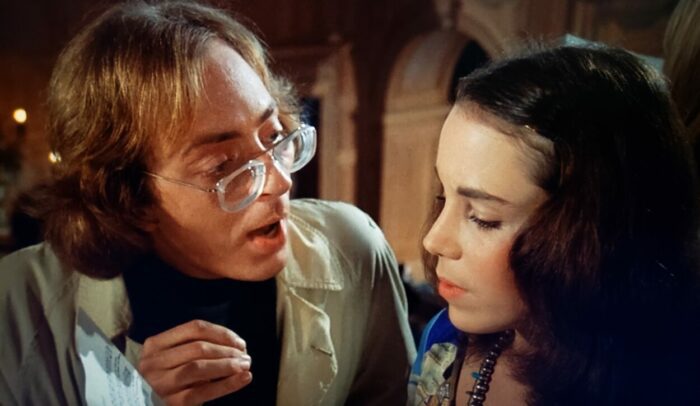
A great deal of this can be seen blossoming in Phantom of the Paradise. Winslow is a tragic figure whose mistreatment warps him into something dangerous. Like other characters De Palma has depicted, he is what the world makes him.
The titular role is built with bricks from no less than four famous stories. These include Goethe’s Faust, Poe’s Cask of Amontillado, The Count of Monte Cristo by Alexandre Dumas, and of course, Gaston Leroux’s Le Fantôme de l’Opéra. However, the cinematic adaptations of that last literary classic have more influence than the book. This is evident in the way certain events unfold.
In the 1943 adaptation, Claude Raines portrays the first version where the Phantom of the Opera is a brilliant musician whose disfigurement is a mutilation not a birth defect. He also reacts homicidally savagely when he believes his music has been stolen. This would influence the 1962 adaptation by Hammer Film Productions wherein a penniless composer has his music stolen by a mediocre musician who passes the brilliance off as his own. The character of Winslow Leach echoes elements of each of these variations throughout De Palma’s outlandish reimagining.
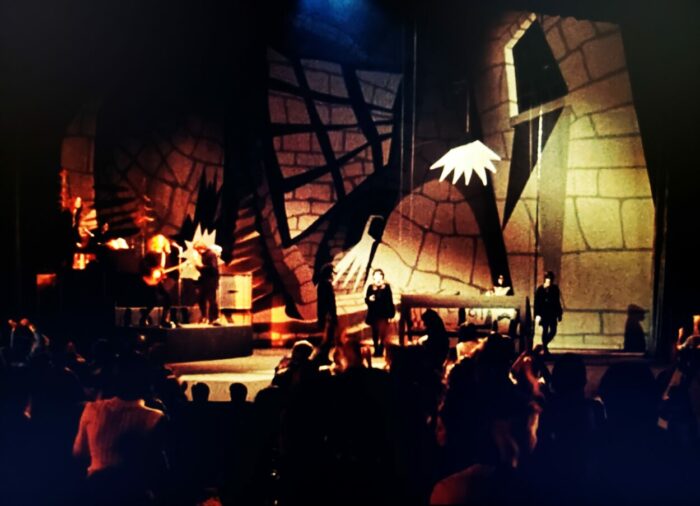
See, Phantom of the Paradise wears a great deal of its cinematic influences out in the open. When Swan debuts a shock rock band called The Dead as well as the glam icon Beef, their stage presentation features a backdrop reminiscent of German Expressionist horror such as 1920’s The Cabinet of Dr. Caligari. At one point, the Phantom puts a ticking time bomb in the trunk of a car as it’s wheeled on stage for a surf rock number. The way the scene unfolds calls to mind similar events in the noir classic Touch of Evil. Then, there’s a recreation of the famous shower scene from Psycho with a comedic twist. Even Winslow’s escape from Sing Sing prison is less Count of Monte Cristo and more Keystone Kops.
In fact, William Finley’s portrayal often involves heightened theatrics more akin to silent era acting than the realism that tended to dominate 1970s cinema. From the start, this makes him sympathetic since the character is a borderline buffoon. Yet, early on there are signs of his instability, and those exaggerated expressions become eerie and sinister following his transformation into the Phantom.
According to Paul Williams, who ended up playing Swan, Brian De Palma originally wanted him to portray the Phantom. However, though flattered, the diminutive songwriter helped steer casting towards William Finley. That said, the part of Swan intrigued Paul Williams more. Understandable since the role is basically the Devil and Dorian Grey with just a dash of a reclusive musical Howard Hughes. Still, an excellent performance wouldn’t be Paul’s only contribution to Phantom of the Paradise.
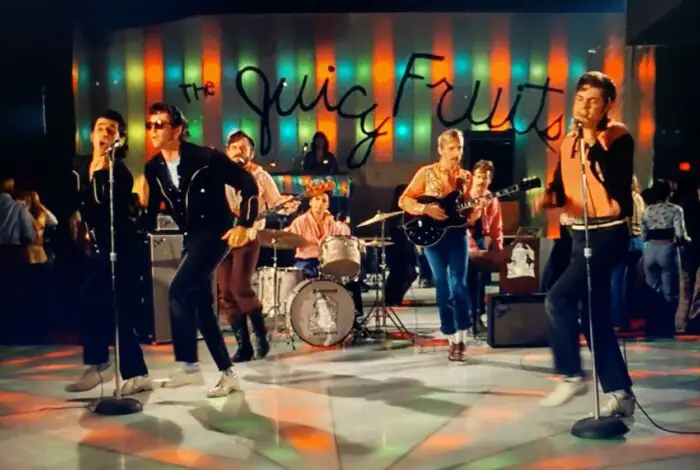
By 1974, Paul Williams held writing credits for hit tunes such as The Carpenter’s “We’ve Only Just Begun” and Three Dog Night’s “An Old Fashioned Love Song”. His career would only go higher in later years earning an Oscar nomination for “Rainbow Connection” from The Muppet Movie in 1979 as well as other chart toppers. With Phantom of the Paradise, Paul Williams was given a unique task.
He said, “It’s amazing [Brian] would pick the guy who co-wrote ‘We’ve Only Just Begun’ to pen songs for a film that was supposed to be depicting the future of rock. But Brian saw something in my music that made him think I could span the various kinds of genres in the film.”
Whenever Phantom remembers it is part musical, the film explores various genres from Fifties rockabilly up to the early Seventies emerging glam scene. The original soundtrack is an audio trip through what was then all of popular rock culture. Consequently, the film is a celebration of these styles while sidewise slipping into a critique of the music industry.
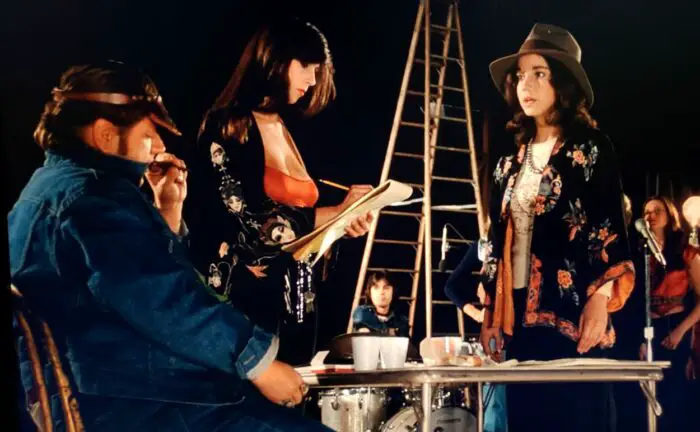
Swan as metaphorical stand in exemplifies the odious ways musicians are treated by the industry. The Faustian bargains they sign strip them of their humanity and autonomy making them nothing more than hired vocal chords. Swan is, in many ways, like modern producer Max Martin: a single (albeit talented) individual whose success allows them to dictate the entire landscape of popular music — one opinion which invariably homogenizes the art form.
Furthermore, Swan is incapable of creativity. His own Dorian Grey-themed Faustian contract has literally left him soulless. His only means of faking creativity afterward is to steal honest emotional expressions from gullible creatives like Winslow. Those who are so concerned with having their music heard they don’t realize the exploitation they’re signing up for. It’s little secret the music industry has a corrupt history that involves stealing musicians’ work and “a toxic industry-wide culture which too often prioritizes profit above the safety and well-being of artists.” All of which Phantom of the Paradise encapsulates in metaphors inspired by Faust not to mention scenes of forced drug abuse to keep performers going against their will.
No one demonstrates this better than Jessica Harper. Her wonderful portrayal of Phoenix shows a starry-eyed singer going from innocent to pill-popping rock cliché in record time. The only problem is her character always seems peripheral as the film focuses more on Swan and the Phantom. Perhaps that’s because the driving force of her character is singing.
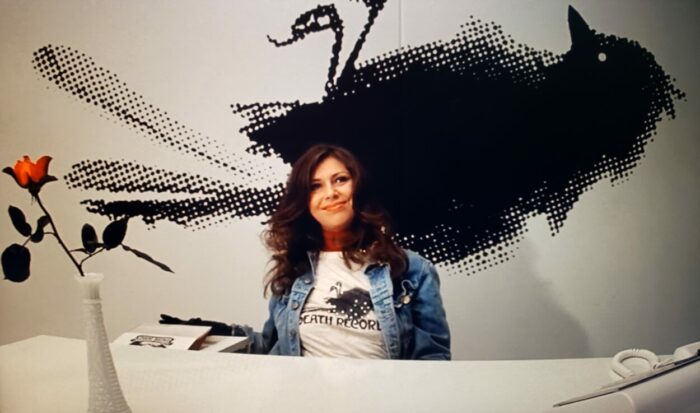
Phantom of the Paradise is hardly a Broadway-style musical, it’s more like a movie where characters occasionally sing. Consequently, songs rarely lead the narrative. Yet taken on their own there are some fantastic pieces. While it’s worth noting Phantom of the Paradise received an Oscar nomination for Best Original Score, there’s a reason it lost to The Great Gatsby in 1974. Regardless of how well certain songs fit into the film, it often feels like Phantom keeps forgetting it’s a musical. In fact, it wants to be several movies at once.
One thing that can make watching Phantom of the Paradise problematic is its sense of chaos. This film oscillates wildly in tone. At times, it wants to be mysterious and creepy. Other occasions call up comical elements. It feels surreal then grounded. For instance, the scene where the titular Phantom is trying to rebuild his voice using synthesizers.
There’s a moving quality to this tortured composer trying to reconstruct his voice, and an interesting subtle note as the artificial singing he develops is done by Paul Williams. His voice starts out dreadfully mechanical yet oddly musical then–as adjustments are made–it becomes more melodious and human. So much is built into the sight and sounds of this one moment it’s easy to see how every scene in the movie is overstuffed with ideas. Some dominate while others disappear in the blend, occasionally lost entirely, and consequently each moment of the movie shifts to whatever the main energy is in a scene.
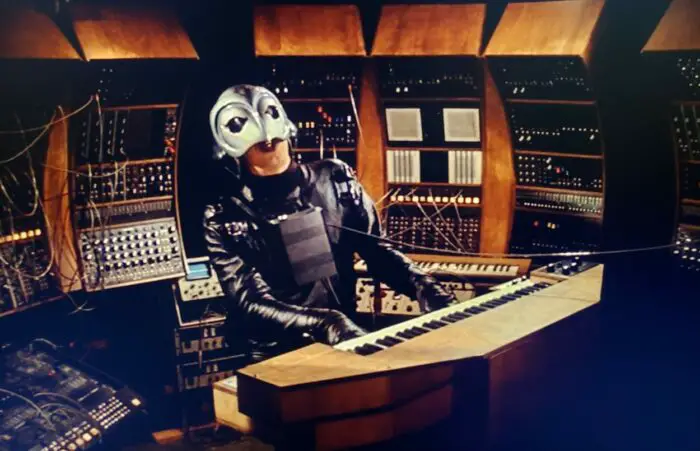
In pieces, Phantom of the Paradise seems to excel. However, as a whole the tonal shifts rock the boat wildly resulting in an uneven film. Though some might say this turbulent presentation might seem anarchic and bold, it’s more often a mess. That may explain why the film failed at the box office as well as with critics. Like any bad art, there’s an honesty to Phantom of the Paradise that only failures can produce.
Brian De Palma’s love of film oozes out every cinematic allusion. Instead of blending into the story, such imagery sticks out. The whacky comedy undermines the horror, but perhaps it makes the tragedy more digestible. The music is inspired by Goethe’s Faust, yet the film is The Phantom of the Opera. Consequently, the soundtrack works better alone but wouldn’t exist without the movie.
Meanwhile, there’s an interesting prescience to Phantom of the Paradise which comments on a growing image obsessed culture. And its presentation oddly mirrors modern social media stars. Consider the way Swan observes the world entirely through cameras, controlling his image and media narrative as well as how he gatekeeps access to fame, a currency almost more valuable than gold.
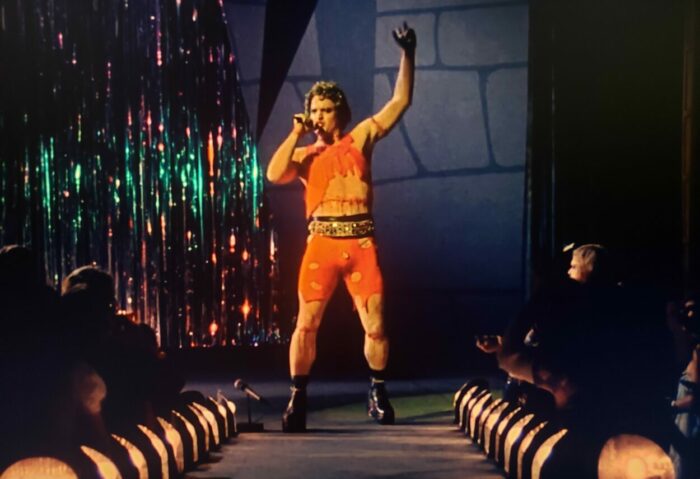
He toys with aspiring starlets and hopeful rock gods, pulling strings tied to their obsessive desire for fame regardless of talent. It’s hard not to make comparisons to contemporary influencer culture, a wasteland of social media pseudo-personalities willing to do anything for attention except show an ounce of originality. Everyone is phony in the Phantom of Paradise or else corrupted under Swan’s thumb, who is himself a victim of his own narcissism. In essence, fame is toxic yet coveted with a price above rubies.
As far as cult classics one couldn’t be in better territory. For instance, there’s a blink and you’ll miss it appearance by Shelly Desai. Daft Punk have seen it twenty times. With this year marking the fiftieth anniversary, Winnipeg is hosting a fantastical viewing celebration.
This earnest mess is always earning new fans. Between the jagged edges is a multifaceted story about love and betrayal, the saving grace of music, and the freakshow of toxic fame. It’s humorous and horrifying. Yet, above all else, Brian De Palma’s Phantom of the Paradise is unafraid to be over the top.


